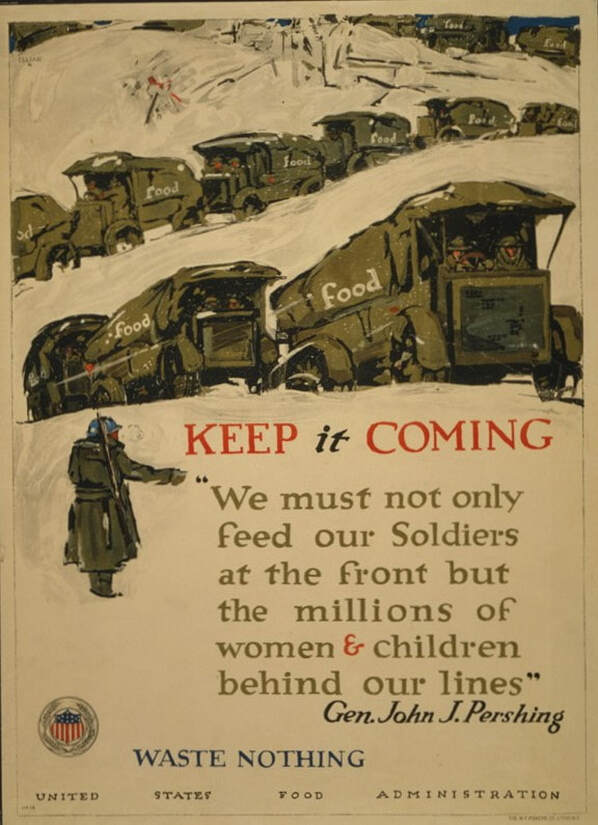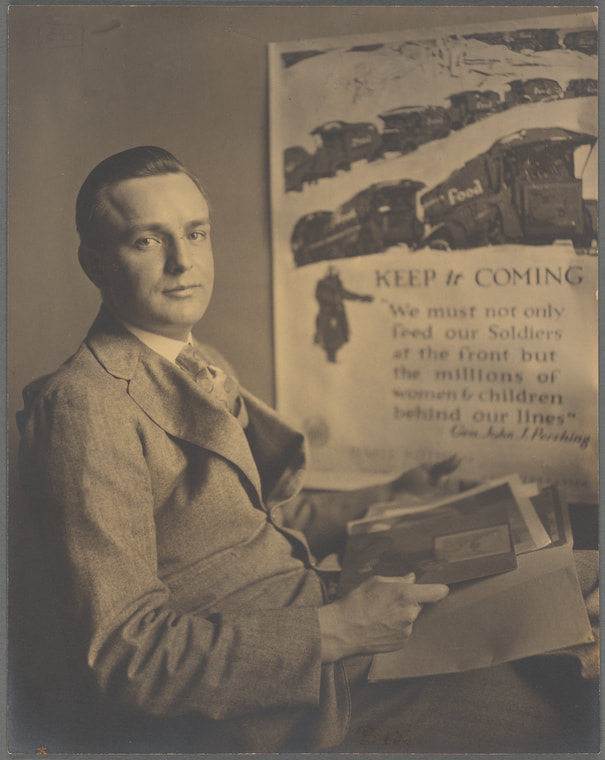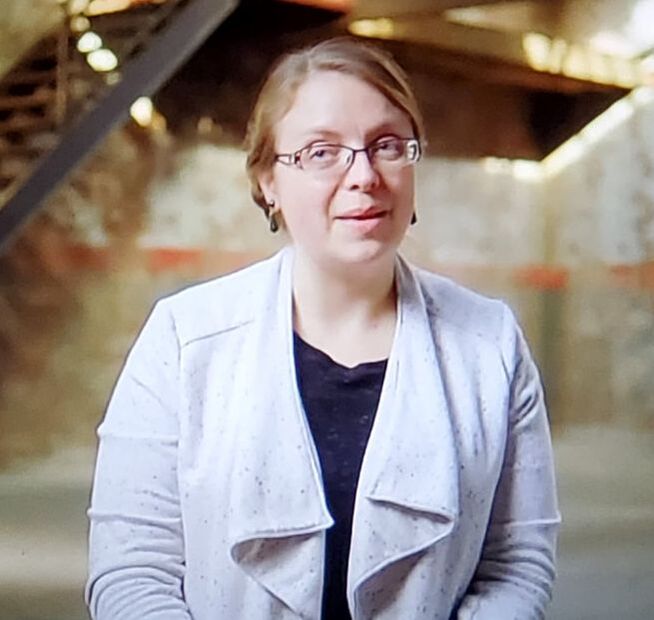|
This poster features a long string of Army green military trucks labeled "Food" snaking through snow-covered hills, directed by a soldier. It reads "Keep it Coming" and features a quote by Gen. John J. Pershing - "We must not only feed our Soldiers at the front but the millions of women & children behind our lines." Underneath reads, "WASTE NOTHING" with the seal and title of the United States Food Administration. Almost certainly printed in the winter of 1917-18, the poster was designed by artist George Illian. "Keep it Coming" was apparently Illian's first poster for the war effort. He went on to design several others for the United States Food Administration, but none as striking as this one. Sadly, I was unable to dig up any information on Illian other than he was a member of the Society of Illustrators and that he did some commercial art after the war. He died in 1932, but I have not been able to find an obituary. The imagery from the poster would not have been unfamiliar to ordinary Americans who had been following the news. By the fall of 1917, American soldiers were in the fields of Europe, led by General John Joseph "Black Jack" Pershing. After three years of brutal war, France and Britain welcomed the Americans, led by Pershing with open arms in June of 1917, but it was not until October of that year that the main bulk of the American Expeditionary Forces would arrive in France. Although the United States had officially entered the war in April of 1917, military personnel numbered under 200,000, and military supply and tactics were largely stuck in the 19th century. It took months of stop-and-start mobilization to train American troops (sometimes with wooden rifles) and get them overseas (on borrowed ships). The winter of 1917-18 was one of the worst in recent memory during the First World War. On December 29, 1917, the New York Times reported "Cold Snap Over Entire East," reporting temperatures in upstate New York as low as 20 degrees below zero. New York Harbor froze, railroads were backed up across the Eastern seaboard, and Europe was engulfed in snow and freezing rain. The weather conditions meant that nearly all of the supplies for Europe and for major Eastern cities were completely backed up. On December 30th, the New York Times reported coal shortages in New England and New York, blaming railroad backups and the requisitioning of civilian ships and tugs for the war effort. The railroad backups resulted in the nationalizing of the railroad system under William McAdoo. Illian's poster reflects the winter conditions on the front lines, too. Although the true horrors of trench warefare were often glossed over by the press, by 1917 many Americans were hearing from their "boys" overseas first hand. Marching in the abnormally frigid cold and torrential rains of the winter of 1917-18 in Europe was familiar to most of the soldiers. While the Eastern U.S. was brought nearly to a standstill by railroad blockages, coal shortages, and frozen ports, Britain, France, and Spain also experienced unusually cold temperatures, high snowfalls, and blocked railroads in December, 1917 and January, 1918. Like many of the propaganda posters of the First World War, "Keep it Coming" exhorts ordinary Americans not only to conserve food for American soldiers overseas, but also to help feed women and children in Allied nations. "Waste Nothing" was part of a campaign to reduce food waste and free up additional supplies to send overseas. American supplies of wheat in particular were low in 1917, and only by reducing consumption could food stocks be freed up for shipment overseas until farmers could increase production. The idea of personal self-sacrifice was part of a larger movement during the war to fund the war effort (through the sale of liberty bonds) and to "do your bit" to help the war effort. By using the wintry backdrop, Illian brought home the message that while Americans might be suffering from cold at home, things were worse in Europe, and American soldiers were doing all they could to help end the war and alleviate hunger and hardship among people who had already suffered four long years of war. 1917-18 would be the only winter warfare most Americans would see in Europe - the war officially ended in November of 1918 - but while millions of soldiers were sent home after Armistice, many Americans would remain in Europe until the summer of 1919, part of the demobilization efforts and cleanup (including burial duty) after the war. The Food Historian blog is supported by patrons on Patreon! Patrons help keep blog posts like this one free and available to the public. Join us for awesome members-only content like free digitized cookbooks from my personal collection, e-newsletter, and even snail mail from time to time! Don't like Patreon? Join with an annual membership below, or just leave a tip! Tip Jar
$1.00 - $20.00
Like what you read, watch, or hear? Wanna help support The Food Historian, but don't want to commit to a monthly thing, or sign up for Patreon? Then you're in luck! You can leave a tip! This one-time (non-tax-deductible) donation helps keep The Food Historian going and pays for things like webhosting, Zoom, additions to the cookbook library, and helps compensate Sarah for her time and energy in helping everyone learn more about the history of food, agriculture, cooking, and more. Thank you!
0 Comments
Your comment will be posted after it is approved.
Leave a Reply. |
AuthorSarah Wassberg Johnson has an MA in Public History from the University at Albany and studies early 20th century food history. Archives
July 2024
Categories
All
|



 RSS Feed
RSS Feed